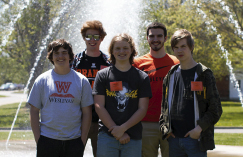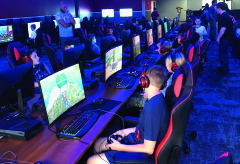Esports Unite Athletes and Entrepreneurs
By Cathy Bonnstetter
The city of Buckhannon is poised to pop in a 21st century kind of way, thanks to a town-and-gown collaboration between West Virginia Wesleyan College (WVWC) and JesterLine Gaming Technologies that gives the city a double shot at making its mark on the technology map—and it all starts downtown.
A New Kind of Athlete
WVWC recently added to its varsity sports lineup with esports, the sport of playing video games. The first higher education institution in the state to embrace this new kind of sport and athlete, WVWC is now recruiting competitive players with the help of scholarships.
Kevin Wu, the school’s esports coach, recently signed on eight esports athletes to compete during the 2019-2020 school year. A graduate of Truman State University, Wu is pleased with his recruiting success and the caliber of his athletes, who were chosen for their overall championship gamer qualities.
“A lot of the skills we were looking at are not necessarily hard skills,” says Wu. “The games change rapidly, and different games become competitive. Adaptability was the main thing.”

Photo by West Virginia Wesleyan College.
Because WVWC is a Division II school, it does not offer full athletic scholarships. However, esports competitors are being given the same options as athletes from traditional sports, which can be as much as $3,000 per year.
While esports is co-ed, this year all the athletes are male. Wu plans to work toward gender inclusivity for the program in the years to come. “It’s unavoidable that the demographics are heavily skewed, but this isn’t necessarily indicative of any gender disparity,” he says. “It’s just a result of the demographics for the interest group.”
Esports are played similarly to track and field events—the athletes can play the same team game or individual games at any given time. Because of the nature of the competition, esports easily fits into a college’s sports repertoire and budget.
“Unlike traditional sports, we do not have to travel to compete,” says Wu. “We expect that our recurring costs will be a lot lower than traditional sports. We don’t bring much revenue, but our sustainability is a lot higher.”
Esports not only give competitive-level gamers a niche in college life, but they also help the athletes hone good workplace skills, according to Wu.
“These athletes show future employers they have the drive to be a higher performer,” he says. “Esports showcase an athlete’s general aptitude and ability to handle stressful situations and learn fast. Esports athletes also demonstrate a strong work ethic.”
WVWC, which is in the process of completing its esports training facility, is now a member of the National Association of College Esports (NACE). Founded in 2016, NACE began with just seven colleges and today has more than 3,000 student athletes from more than 130 schools.
Wu, who spearheaded an esports team at his alma mater, has modest goals for WVWC’s first year of competition.
“We just want to be able to compete and have a presence,” he says. “A lot of schools have been doing this for a few years, and those are our competition. This year we want to see how we can optimize, figure out our infrastructure and get everyone on the same page.”
JesterLine’s Cutting-Edge Training Facility
On the same day in early March that WVWC announced its esports team, West Virginia natives and Buckhannon residents Jarod and Lacy Ramsey opened the doors to JesterLine Gaming Technologies on Main Street, the state’s first high-end gaming center.
“There is no case to be made that esports doesn’t have high growth potential, but people who are not familiar with it will not get that,” says Wu. “JesterLine can be the bridge. It is a good way to get the idea across that this is real and makes sense.”

Photo by Jarod Ramsey.
In addition to interactive space, JesterLine also maintains 20 esports machines, 10 console gaming stations and six virtual reality pods. Patrons can purchase game time at the center, choosing from a host of games, three different gaming systems and virtual reality options. Jarod, an information technology professional, and Wu have discussed ways to collaborate.
JesterLine has hosted WVWC events, including a Greek week virtual reality competition, and will also play a part in the college’s 2019 homecoming activities.
“The community can see the gaming industry at the collegiate level right here in their hometown,” says Jarod. “We want to let future college students see this opportunity. How often do community members get to play a sport with collegiate athletes? That makes this sport unique.”
A Next-Generation Economic Driver
According to Lacy, JesterLine’s Main Street location has directly contributed to this unique business’ successful launch.
“Buckhannon has a vibrant Main Street,” she says. “People will just stop in to see what we’re about. Upshur County is also centrally located, so we can also draw from Randolph and Lewis counties. We have already had people reaching out from other areas. We can also stream events for people to watch from here. This could be a tremendous benefit for the commerce and tourism in our area.”
David McCauley, mayor of Buckhannon and general legal counsel and senior lecturer at WVWC, says JesterLine can be a catalyst for economic and cultural growth.
“This type of entertainment is the wave of the future,” he says. “The gamers have to eat, drink and be lodged somewhere, and we have terrific amenities to meet all those needs. The potential impact is a tremendous one for our local economy. The more options we provide people, the better our community becomes.”
McCauley says the town-and-gown connection is nothing new for Buckhannon. “Our college is a great collaborator, especially with our school system and the city,” he says. “Wesleyan is integral to our city’s success. As Wesleyan goes, so goes Buckhannon and vice versa. Kids from our community interacting with Wesleyan students is always a good thing.”
With the evolution of gaming as both entertainment and a sport, gaming centers are becoming commonplace across the globe. The JesterLine and Wesleyan collaboration may just give downtown Buckhannon what it needs to open a new door as a technology go-to city.
“With both JesterLine and Wesleyan downtown, we hope we will be able to say Buckhannon was the first to put technology on the radar for West Virginia,” says Lacy. “West Virginia tends to fall off the radar with cool new things. We want to go against the grain and prove people wrong—we can keep up with other cities.”








